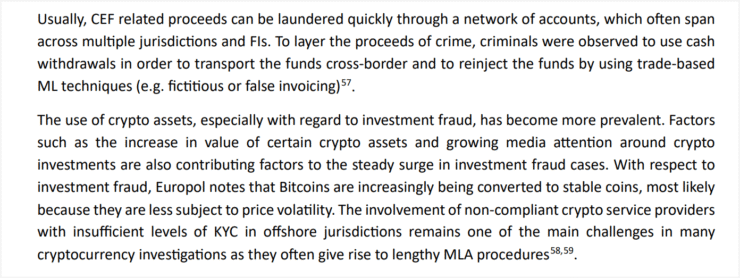Luxembourg’s latest National Risk Assessment (NRA) has formally classified virtual asset service providers (VASPs) as high-risk entities for money laundering—reflecting growing regulatory concerns about crypto’s vulnerability to misuse.
Published as part of the country’s 2025 financial crime risk framework, the report assigns a “High” inherent risk level to crypto firms, citing multiple red flags. These include large transaction volumes, broad and often anonymous client bases, complex legal structures, diverse distribution models, and cross-border operations—all of which heighten the potential for illicit financial flows.

The warning builds on earlier assessments. In 2020, Luxembourg’s first NRA flagged crypto assets as an emerging concern. By 2022, the threat level was raised to “very high” due to the sector’s digital, borderless nature and limited regulatory oversight.
Despite the country’s pro-innovation stance and increasing local interest in digital assets, the latest assessment signals Luxembourg’s effort to strike a balance—supporting fintech while tightening anti-money laundering (AML) enforcement. It’s a trend mirrored across many EU nations as digital finance grows in popularity.
MiCA Shapes EU’s Unified Crypto Regulation
As a founding EU member, Luxembourg is aligning its crypto oversight with the bloc’s broader push for regulatory consistency, led by the Markets in Crypto-Assets (MiCA) framework. MiCA is a landmark effort to harmonize crypto rules across the EU’s 27 member states, aiming to replace fragmented national approaches with a single regulatory regime.
Under MiCA, crypto asset service providers (CASPs) must obtain licenses to operate across the EU. Several major firms—such as Kraken and Crypto.com—have already secured licenses and begun offering regulated derivatives products across the region. These approvals set the tone for what is expected to become standard practice in Europe’s crypto markets.
MiCA also imposes strict conditions on stablecoin issuers. The framework introduces transparency requirements, reserve standards, and EU-based licensing rules. In response, Tether—the issuer of the world’s largest stablecoin, USDt (USDT)—has resisted compliance. As a result, it has been delisted from several platforms, including Crypto.com, Coinbase, and Binance’s EU operations.
Laundering Cases Highlight Crypto Crime Risks
As digital assets gain prominence in global finance, their use in money laundering and cross-border crime is drawing increased attention from authorities. Recent high-profile cases underscore the scale of illicit activity and the urgent need for tighter crypto regulation.
In early May, Hong Kong police dismantled a cross-border laundering ring that used over 500 bank accounts and cryptocurrencies to wash HK$118 million ($15 million). Twelve individuals were arrested. Authorities said the scheme relied on digital assets to obscure the movement of funds and evade detection across jurisdictions.
Separately, a European police operation uncovered a so-called “mafia crypto bank” allegedly used to launder over €21 million ($23.5 million) in criminal proceeds. Linked to networks in the Middle East and China, the operation resulted in 17 arrests and the seizure of €4.5 million ($5 million) in assets, including cash, crypto, luxury cars, weapons, and electronics.
These cases highlight the dual-use nature of crypto assets and the importance of effective oversight. They also reinforce the need for frameworks like MiCA, which aims to bring stricter compliance standards and more robust monitoring to Europe’s crypto industry.
Quick Facts
- Luxembourg labels crypto firms “high risk” for money laundering
- 2025 NRA cites large, anonymous client bases and cross-border risk
- MiCA sets EU-wide standards for crypto firm licensing and compliance
- Stablecoin rules push Tether off multiple EU trading platforms
- Police in Hong Kong and Europe dismantle major laundering networks





